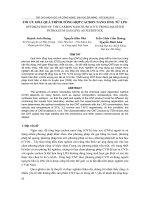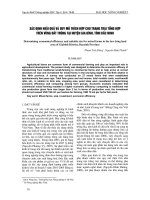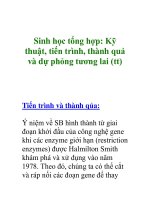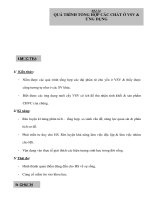Cách coding verilog cho quá trình tổng hợp netlist - Verilog HDL
Bạn đang xem bản rút gọn của tài liệu. Xem và tải ngay bản đầy đủ của tài liệu tại đây (50.65 KB, 35 trang )
Following is the Ver ilog code for flip-flop
with a positive-e dge clock.
module flop (clk, d, q);
input clk, d;
output q;
reg q;
always @(posedge clk)
begin
q <= d;
end
endmodule
Following is Verilog code for a flip-flop with
a negative-edge clock an d asynchronous clear.
module flop (clk, d, clr, q);
input clk, d, clr;
output q;
reg q;
always @(negedge clk or posedge clr)
begin
if (clr)
q <= 1’b0;
else
q <= d;
end
endmodule
Following is Verilog code for the flip-flop
with a positive-e dge clock and synchronous set.
module flop (clk, d, s, q);
input clk, d, s;
output q;
reg q;
always @(posedge clk)
begin
if (s)
q <= 1’b1;
else
q <= d;
end
endmodule
Following is Verilog code for the flip-flop
with a positive-e dge clock and clock enable.
module flop (clk, d, ce, q);
input clk, d, ce;
output q;
reg q;
always @(posedge clk)
begin
if (ce)
q <= d;
end
endmodule
Following is Verilog code for a 4-bit register
with a positive-e dge clock, asynchronous set
and clock enable.
module flop (clk, d, ce, pre, q);
input clk, ce, pre;
input [3:0] d;
output [3:0] q;
reg [3:0] q;
always @(posedge clk or posedge pre)
begin
if (pre)
q <= 4’b1111;
else if (ce)
q <= d;
end
endmodule
Following is the Ver ilog code for a latch with
a positive gate.
module latch (g, d, q);
input g, d;
output q;
reg q;
always @(g or d)
begin
if (g)
q <= d;
end
endmodule
Following is the Ver ilog code for a latch with
a positive gate and an asynchronous clear.
module latch (g, d, clr, q);
input g, d, clr;
output q;
reg q;
always @(g or d or clr)
begin
if (clr)
q <= 1’b0;
else if (g)
q <= d;
end
endmodule
Following is Verilog code for a 4-bit latch
with an inverted gate an d an asynchronous
preset.
module latch (g, d, pre, q);
input g, pre;
input [3:0] d;
output [3:0] q;
reg [3:0] q;
always @(g or d or pre)
begin
if (pre)
q <= 4’b1111;
else if (~g)
q <= d;
end
endmodule
Following is Verilog code for a tristate
element using a combinat orial process and
always block.
module three_st (t, i, o);
input t, i;
output o;
reg o;
always @(t or i)
begin
if (~t)
o = i;
else
o = 1’bZ;
end
endmodule
Following is the Ver ilog code for a tristate
element using a concurrent assignment.
module three_st (t, i, o);
input t, i;
output o;
assign o = (~t) ? i: 1’bZ;
endmodule
Following is the Ver ilog code for a 4-bit
unsigned up counter with asynchronous clear.
module counter (clk, clr, q);
input clk, clr;
output [3:0] q;
reg [3:0] tmp;
always @(posedge clk or posedge clr)
begin
if (clr)
tmp <= 4’b0000;
else
tmp <= tmp + 1’b1;
end
assign q = tmp;
endmodule
Following is the Ver ilog code for a 4-bit
unsigned down counter with synchronous set.
module counter (clk, s, q);
input clk, s;
output [3:0] q;
reg [3:0] tmp;
always @(posedge clk)
begin
if (s)
tmp <= 4’b1111;
else
tmp <= tmp - 1’b1;
end
assign q = tmp;
endmodule
Following is the Ver ilog code for a 4-bit
unsigned up counter with an asynchronous load
from the primary input.
module counter (clk, load, d, q);
input clk, load;
input [3:0] d;
output [3:0] q;
reg [3:0] tmp;
always @(posedge clk or posedge load)
begin
if (load)
tmp <= d;
else
tmp <= tmp + 1’b1;
end
assign q = tmp;
endmodule
Following is the Ver ilog code for a 4-bit
unsigned up counter with a synchronous load
with a constant.
module counter (clk, sload, q);
input clk, sload;
output [3:0] q;
reg [3:0] tmp;
always @(posedge clk)
begin
if (sload)
tmp <= 4’b1010;
else
tmp <= tmp + 1’b1;
end
assign q = tmp;
endmodule
Following is the Ver ilog code for a 4-bit
unsigned up counter with an asynchronous clear
and a clock enable.
module counter (clk, clr, ce, q);
input clk, clr, ce;
output [3:0] q;
reg [3:0] tmp;
always @(posedge clk or posedge clr)
begin
if (clr)
tmp <= 4’b0000;
else if (ce)
tmp <= tmp + 1’b1;
end
assign q = tmp;
endmodule
Following is the Ver ilog code for a 4-bit
unsigned up/down counter with an asynchronous
clear.
module counter (clk, clr, up_down, q);
input clk, clr, up_down;
output [3:0] q;
reg [3:0] tmp;
always @(posedge clk or posedge clr)
begin
if (clr)
tmp <= 4’b0000;
else if (up_down)
tmp <= tmp + 1’b1;
else
tmp <= tmp - 1’b1;
end
assign q = tmp;
endmodule
Following is the Ver ilog code for a 4-bit
signed up counter with an asynchronous reset.
module counter (clk, clr, q);
input clk, clr;
output signed [3:0] q;
reg signed [3:0] tmp;
always @ (posedge clk or posedge clr)
begin
if (clr)
tmp <= 4’b0000;
else
tmp <= tmp + 1’b1;
end
assign q = tmp;
endmodule
Following is the Ver ilog code for a 4-bit
signed up counter with an asynchronous reset
and a modulo maximum.
module counter (clk, clr, q);
parameter MAX_SQRT = 4, MAX = (MAX_SQRT*MAX_SQRT);
input clk, clr;
output [MAX_SQRT-1:0] q;
reg [MAX_SQRT-1:0] cnt;
always @ (posedge clk or posedge clr)
begin
if (clr)
cnt <= 0;
else
cnt <= (cnt + 1) %MAX;
end
assign q = cnt;
endmodule
Following is the Ver ilog code for a 4-bit
unsigned up accumulator with an asynchronous
clear.
module accum (clk, clr, d, q);
input clk, clr;
input [3:0] d;
output [3:0] q;
reg [3:0] tmp;
always @(posedge clk or posedge clr)
begin
if (clr)
tmp <= 4’b0000;
else
tmp <= tmp + d;
end
assign q = tmp;
endmodule
Following is the Ver ilog code for an 8-bit
shift-left register with a positive-edge clock,
serial in and serial out.
module shift (clk, si, so);
input clk,si;
output so;
reg [7:0] tmp;
always @(posedge clk)
begin
tmp <= tmp << 1;
tmp[0] <= si;
end
assign so = tmp[7];
endmodule
Following is the Ver ilog code for an 8-bit
shift-left register with a negative-edge clock,
a clock enable, a serial in and a serial out.
module shift (clk, ce, si, so);
input clk, si, ce;
output so;
reg [7:0] tmp;
always @(negedge clk)
begin
if (ce) begin
tmp <= tmp << 1;
tmp[0] <= si;
end
end
assign so = tmp[7];
endmodule
Following is the Ver ilog code for an 8-bit
shift-left register with a positive-edge clock,
asynchronous clear, ser ial in and serial out.
module shift (clk, clr, si, so);
input clk, si, clr;
output so;
reg [7:0] tmp;
always @(posedge clk or posedge clr)
begin
if (clr)
tmp <= 8’b00000000;
else
tmp <= {tmp[6:0], si};
end
assign so = tmp[7];
endmodule
Following is the Ver ilog code for an 8-bit
shift-left register with a positive-edge clock,
a synchronous set, a ser ial in and a serial
out.
module shift (clk, s, si, so);
input clk, si, s;
output so;
reg [7:0] tmp;
always @(posedge clk)
begin
if (s)
tmp <= 8’b11111111;
else
tmp <= {tmp[6:0], si};
end
assign so = tmp[7];
endmodule
Following is the Ver ilog code for an 8-bit
shift-left register with a positive-edge clock,
a serial in and a paralle l out.
module shift (clk, si, po);
input clk, si;
output [7:0] po;
reg [7:0] tmp;
always @(posedge clk)
begin
tmp <= {tmp[6:0], si};
end
assign po = tmp;
endmodule
Following is the Ver ilog code for an 8-bit
shift-left register with a positive-edge clock,
an asynchronous paralle l load, a serial in and
a serial out.
module shift (clk, load, si, d, so);
input clk, si, load;
input [7:0] d;
output so;
reg [7:0] tmp;
always @(posedge clk or posedge load)
begin
if (load)
tmp <= d;
else
tmp <= {tmp[6:0], si};
end
assign so = tmp[7];
endmodule
Following is the Ver ilog code for an 8-bit
shift-left register with a positive-edge clock,
a synchronous paralle l load, a serial in and a
serial out.
module shift (clk, sload, si, d, so);
input clk, si, sload;
input [7:0] d;
output so;
reg [7:0] tmp;
always @(posedge clk)
begin
if (sload)
tmp <= d;
else
tmp <= {tmp[6:0], si};
end
assign so = tmp[7];
endmodule
Following is the Ver ilog code for an 8-bit
shift-left/shift-r ight register with a
positive-edge clock, a serial in and a serial
out.
module shift (clk, si, left_right, po);
input clk, si, left_right;
output po;
reg [7:0] tmp;
always @(posedge clk)
begin
if (left_right == 1’b0)
tmp <= {tmp[6:0], si};
else
tmp <= {si, tmp[7:1]};
end
assign po = tmp;
endmodule
Following is the Ver ilog code for a 4-to-1 1-
bit MUX using an If statement .
module mux (a, b, c, d, s, o);
input a,b,c,d;
input [1:0] s;
output o;
reg o;
always @(a or b or c or d or s)
begin
if (s == 2’b00)
o = a;
else if (s == 2’b01)
o = b;
else if (s == 2’b10)
o = c;
else
o = d;
end
endmodule
Following is the Ver ilog Code for a 4-to-1 1-
bit MUX using a Case st atement.
module mux (a, b, c, d, s, o);
input a, b, c, d;
input [1:0] s;
output o;
reg o;
always @(a or b or c or d or s)
begin
case (s)
2’b00 : o = a;
2’b01 : o = b;
2’b10 : o = c;
default : o = d;
endcase
end
endmodule
Following is the Ver ilog code for a 3-to-1 1-
bit MUX with a 1-b it latch.
module mux (a, b, c, d, s, o);
input a, b, c, d;
input [1:0] s;
output o;
reg o;
always @(a or b or c or d or s)
begin
if (s == 2’b00)
o = a;
else if (s == 2’b01)
o = b;
else if (s == 2’b10)
o = c;
end
endmodule
Following is the Ver ilog code for a 1-of-8
decoder.
module mux (sel, res);
input [2:0] sel;
output [7:0] res;
reg [7:0] res;
always @(sel or res)
begin
case (sel)
3’b000 : res = 8’b00000001;
3’b001 : res = 8’b00000010;
3’b010 : res = 8’b00000100;
3’b011 : res = 8’b00001000;
3’b100 : res = 8’b00010000;
3’b101 : res = 8’b00100000;
3’b110 : res = 8’b01000000;
default : res = 8’b10000000;
endcase
end
endmodule
Following Verilog c ode leads to the inference
of a 1-of-8 decoder.
module mux (sel, res);
input [2:0] sel;
output [7:0] res;
reg [7:0] res;
always @(sel or res) begin
case (sel)
3’b000 : res = 8’b00000001;
3’b001 : res = 8’b00000010;
3’b010 : res = 8’b00000100;
3’b011 : res = 8’b00001000;
3’b100 : res = 8’b00010000;
3’b101 : res = 8’b00100000;
// 110 and 111 selector values are unused
default : res = 8’bxxxxxxxx;
endcase
end
endmodule
Following is the Ver ilog code for a 3-bit 1-of-
9 Priority Encoder.
module priority (sel, code);
input [7:0] sel;
output [2:0] code;
reg [2:0] code;
always @(sel)
begin
if (sel[0])
code = 3’b000;
else if (sel[1])
code = 3’b001;
else if (sel[2])
code = 3’b010;
else if (sel[3])
code = 3’b011;
else if (sel[4])
code = 3’b100;
else if (sel[5])
code = 3’b101;
else if (sel[6])
code = 3’b110;
else if (sel[7])
code = 3’b111;
else
code = 3’bxxx;
end
endmodule
Following is the Ver ilog code for a logical
shifter.
module lshift (di, sel, so);
input [7:0] di;
input [1:0] sel;
output [7:0] so;
reg [7:0] so;
always @(di or sel)
begin
case (sel)
2’b00 : so = di;
2’b01 : so = di << 1;
2’b10 : so = di << 2;
default : so = di << 3;
endcase
end
endmodule
Following is the Ver ilog code for an unsigned
8-bit adder with carry in .
module adder(a, b, ci, sum);
input [7:0] a;
input [7:0] b;
input ci;
output [7:0] sum;
assign sum = a + b + ci;
endmodule
Following is the Ver ilog code for an unsigned
8-bit adder with carry out .
module adder(a, b, sum, co);
input [7:0] a;
input [7:0] b;
output [7:0] sum;
output co;
wire [8:0] tmp;
assign tmp = a + b;
assign sum = tmp [7:0];
assign co = tmp [8];
endmodule
Following is the Ver ilog code for an unsigned
8-bit adder with carry in and carry out.
module adder(a, b, ci, sum, co);
input ci;
input [7:0] a;
input [7:0] b;
output [7:0] sum;
output co;
wire [8:0] tmp;
assign tmp = a + b + ci;
assign sum = tmp [7:0];
assign co = tmp [8];
endmodule
Following is the Ver ilog code for an unsigned
8-bit adder/subtractor.
module addsub(a, b, oper, res);
input oper;
input [7:0] a;
input [7:0] b;
output [7:0] res;
reg [7:0] res;
always @(a or b or oper)
begin
if (oper == 1’b0)
res = a + b;
else
res = a - b;
end
endmodule
Following is the Ver ilog code for an unsigned
8-bit greater or equal c omparator.
module compar(a, b, cmp);
input [7:0] a;
input [7:0] b;
output cmp;
assign cmp = (a >= b) ? 1’b1 : 1’b0;
endmodule
Following is the Ver ilog code for an unsigned
8x4-bit multiplier.
module compar(a, b, res);
input [7:0] a;
input [3:0] b;
output [11:0] res;
assign res = a * b;
endmodule
Following Verilog tem plate shows the
multiplication operat ion placed outside the
always block and the pipe line stages
represented as single registers.
module mult(clk, a, b, mult);
input clk;
input [17:0] a;
input [17:0] b;
output [35:0] mult;
reg [35:0] mult;
reg [17:0] a_in, b_in;
wire [35:0] mult_res;
reg [35:0] pipe_1, pipe_2, pipe_3;
assign mult_res = a_in * b_in;
always @(posedge clk)
begin
a_in <= a;
b_in <= b;
pipe_1 <= mult_res;
pipe_2 <= pipe_1;
pipe_3 <= pipe_2;
mult <= pipe_3;
end
endmodule
Following Verilog tem plate shows the
multiplication operat ion placed inside the
always block and the pipe line stages are
represented as single registers.
module mult(clk, a, b, mult);
input clk;
input [17:0] a;
input [17:0] b;
output [35:0] mult;
reg [35:0] mult;
reg [17:0] a_in, b_in;
reg [35:0] mult_res;
reg [35:0] pipe_2, pipe_3;
always @(posedge clk)
begin
a_in <= a;
b_in <= b;
mult_res <= a_in * b_in;
pipe_2 <= mult_res;
pipe_3 <= pipe_2;
mult <= pipe_3;
end
endmodule
Following Verilog tem plate shows the
multiplication operat ion placed outside the
always block and the pipe line stages
represented as single registers.
module mult(clk, a, b, mult);
input clk;
input [17:0] a;
input [17:0] b;
output [35:0] mult;
reg [35:0] mult;
reg [17:0] a_in, b_in;
wire [35:0] mult_res;
reg [35:0] pipe_1, pipe_2, pipe_3;
assign mult_res = a_in * b_in;
always @(posedge clk)
begin
a_in <= a;
b_in <= b;
pipe_1 <= mult_res;
pipe_2 <= pipe_1;
pipe_3 <= pipe_2;
mult <= pipe_3;
end
endmodule
Following Verilog tem plate shows the
multiplication operat ion placed inside the
always block and the pipe line stages are
represented as single registers.
module mult(clk, a, b, mult);
input clk;
input [17:0] a;
input [17:0] b;
output [35:0] mult;
reg [35:0] mult;
reg [17:0] a_in, b_in;
reg [35:0] mult_res;
reg [35:0] pipe_2, pipe_3;
always @(posedge clk)
begin
a_in <= a;
b_in <= b;
mult_res <= a_in * b_in;
pipe_2 <= mult_res;
pipe_3 <= pipe_2;
mult <= pipe_3;
end
endmodule
Following Verilog tem plate shows the
multiplication operat ion placed outside the
always block and the pipe line stages
represented as shift re gisters.
module mult3(clk, a, b, mult);
input clk;
input [17:0] a;
input [17:0] b;
output [35:0] mult;
reg [35:0] mult;
reg [17:0] a_in, b_in;
wire [35:0] mult_res;
reg [35:0] pipe_regs [3:0];
assign mult_res = a_in * b_in;
always @(posedge clk)
begin
a_in <= a;
b_in <= b;
{pipe_regs[3],pipe_regs[2],pipe_regs[1],pipe_regs[0]}
<=
{mult, pipe_regs[3],pipe_regs[2],pipe_regs[1]};
end
endmodule
Following templates t o implement Multiplier
Adder with 2 Register Le vels on Multiplier
Inputs in Verilog.
module mvl_multaddsub1(clk, a, b, c, res);
input clk;
input [07:0] a;
input [07:0] b;
input [07:0] c;
output [15:0] res;
reg [07:0] a_reg1, a_reg2, b_reg1, b_reg2;
wire [15:0] multaddsub;
always @(posedge clk)
begin
a_reg1 <= a;
a_reg2 <= a_reg1;
b_reg1 <= b;
b_reg2 <= b_reg1;
end
assign multaddsub = a_reg2 * b_reg2 + c;
assign res = multaddsub;
endmodule
Following is the Ver ilog code for resource
sharing.
module addsub(a, b, c, oper, res);
input oper;
input [7:0] a;
input [7:0] b;
input [7:0] c;
output [7:0] res;
reg [7:0] res;
always @(a or b or c or oper)
begin
if (oper == 1’b0)
res = a + b;
else
res = a - c;
end
endmodule
Following templates sh ow a single-port RAM in
read-first mode.
module raminfr (clk, en, we, addr, di, do);
input clk;
input we;
input en;
input [4:0] addr;
input [3:0] di;
output [3:0] do;
reg [3:0] RAM [31:0];
reg [3:0] do;
always @(posedge clk)
begin
if (en) begin
if (we)
RAM[addr] <= di;
do <= RAM[addr];
end
end
endmodule
Following templates sh ow a single-port RAM in
write-first mode.
module raminfr (clk, we, en, addr, di, do);
input clk;
input we;
input en;
input [4:0] addr;
input [3:0] di;
output [3:0] do;
reg [3:0] RAM [31:0];
reg [4:0] read_addr;
always @(posedge clk)
begin
if (en) begin
if (we)
RAM[addr] <= di;
read_addr <= addr;
end
end
assign do = RAM[read_addr];
endmodule
Following templates sh ow a single-port RAM in
no-change mode.
module raminfr (clk, we, en, addr, di, do);
input clk;
input we;
input en;
input [4:0] addr;
input [3:0] di;
output [3:0] do;
reg [3:0] RAM [31:0];
reg [3:0] do;
always @(posedge clk)
begin
if (en) begin
if (we)
RAM[addr] <= di;
else
do <= RAM[addr];
end
end
endmodule
Following is the Ver ilog code for a single-port
RAM with asynchronous re ad.
module raminfr (clk, we, a, di, do);
input clk;









